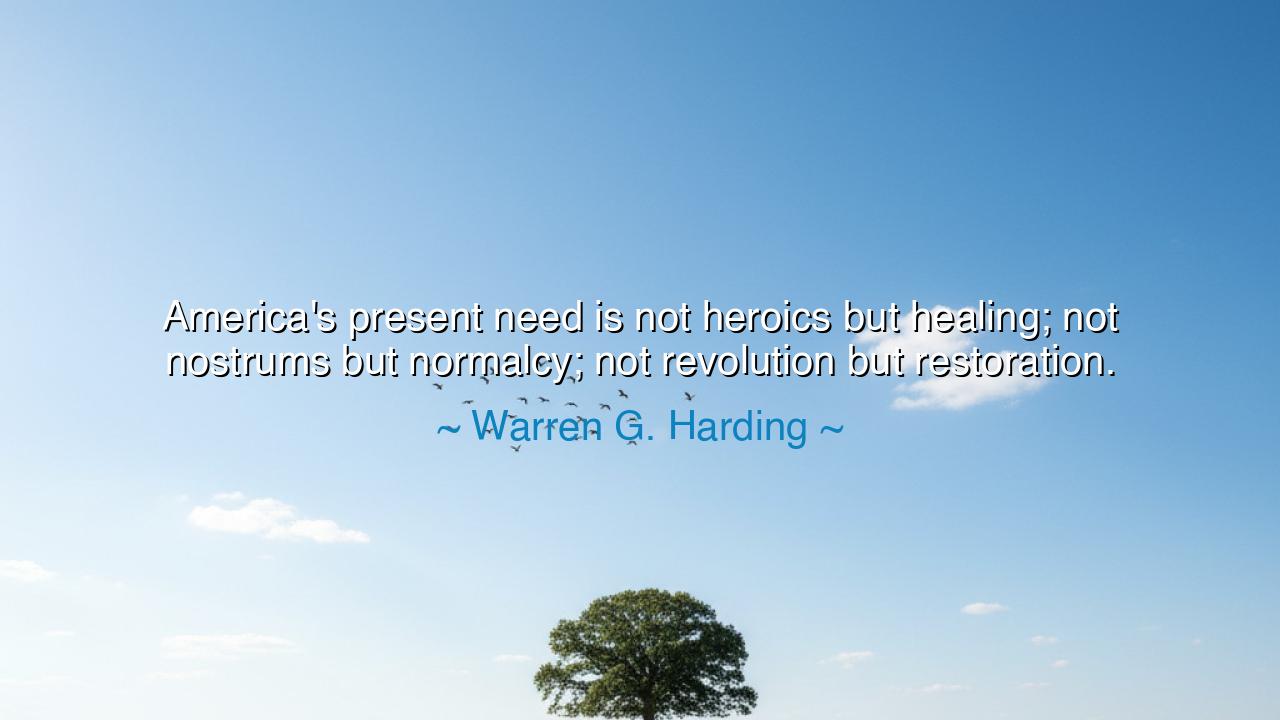
America's present need is not heroics but healing; not nostrums
America's present need is not heroics but healing; not nostrums but normalcy; not revolution but restoration.






The words of Warren G. Harding — “America’s present need is not heroics but healing; not nostrums but normalcy; not revolution but restoration.” — were spoken in the aftermath of fire and upheaval. The First World War had scarred the soul of America, leaving behind not only the graves of soldiers but also the unrest of strikes, economic turbulence, and the influenza pandemic. Harding, ascending to the presidency in 1920, called not for new crusades or greater storms of change, but for peace, quiet, and the slow work of mending.
The meaning of his words is clear: in times of exhaustion, a people do not always hunger for heroics, which demand sacrifice, but for healing, which restores life. They do not need nostrums — false remedies or promises of miracle cures — but normalcy, the return to rhythms of stability and trust. They do not need revolution, with its endless tumults, but restoration, a rebuilding of what was lost and a return to foundations. Harding spoke to a weary nation, offering not fire but calm, not the sword but the balm.
History reflects the weight of this moment. After the terror of the French Revolution, France too longed for order, and found it, briefly, under Napoleon’s promise of stability. Likewise, America in 1920 did not clamor for another upheaval but for the steadying hand that could soothe rather than stir. Harding’s words, though often remembered as political rhetoric, reveal a universal truth: when a nation bleeds from too many wounds, its greatest need is not conquest but rest.
Yet there is irony in these words as well. Harding’s own presidency, though founded on a promise of normalcy, became marred by scandal and corruption, most famously the Teapot Dome affair. His vision of restoration proved fragile, his healing incomplete. Still, his words outlived his failures, for they capture a yearning that echoes across ages: the longing of people, after storms of conflict, for quiet days and steady ground.
Let this wisdom endure: in every age there is a season for struggle, but also a season for restoration. A nation cannot live forever in revolution, nor can it thrive forever in complacency. Harding’s words remind us that the true art of leadership is knowing which season has come — when to call for courage and when to call for calm. And in his voice, we hear the timeless truth: the greatest victories are not always won by heroics, but by the gentle power of healing.






Pphuc
Harding’s quote is thought-provoking, especially when considering current times of political and social turmoil. Restoration over revolution sounds like a call for unity and recovery, but does it risk stifling the necessary conversations around progress and reform? How do we balance the need for stability with the need for bold action when the existing systems are not serving everyone equally?
VHLuu Van Hung
This quote by Warren G. Harding makes me think about how sometimes society looks for immediate, heroic solutions to problems when what’s needed is a slow, steady process of healing. However, is it possible that a focus on ‘restoration’ might impede progress, especially when current systems have flaws that need to be addressed? Should we always look back, or should we also focus on moving forward?
HTNguyen Ha Trang
Harding’s words about America’s need for ‘restoration’ rather than ‘revolution’ resonate as a plea for calm and rationality. But does this overlook the fact that some issues might require more than just returning to a previous state of affairs? Can normalcy ever truly address the fundamental challenges of a society that’s undergoing significant changes or facing deep-rooted inequities?
MNTran Minh Ngoc
Warren G. Harding’s quote reflects a call for stability and healing, rather than grand gestures or extreme change. Is this an ideal approach for times of national crisis, or does it imply a reluctance to address deeper, systemic issues? In periods of intense social or political division, can ‘normalcy’ truly provide the healing we need, or does it risk ignoring the need for significant reform?